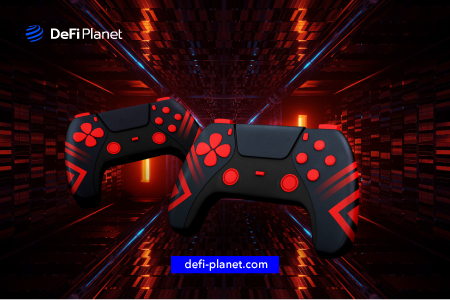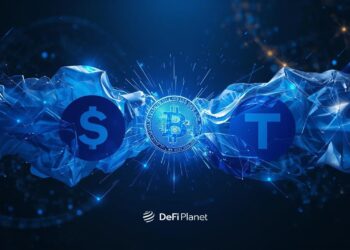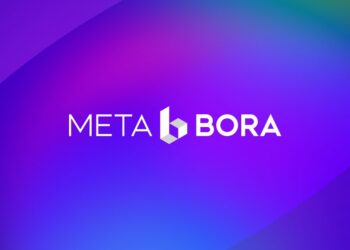A centralized model is used in most online games. This means that all related data is stored on a server under the complete control of the game’s administrators.
Account information and server history are typical examples of such data. The server history records and saves all events and in-game assets collected by players.
Since a single company owns the database, players don’t own their accounts or items.
In other words, game companies have all the control and power in their custody. This is about to change with the introduction of blockchain technology.
Blockchain has become a crucial part of many industries, including gaming. This article will examine in detail, how blockchain is transforming the gaming industry and the limitations of blockchain technology in gaming.
How is Blockchain Used in Gaming?
A blockchain is a distributed, decentralized digital ledger that allows for the secure storage of transactions and records. It has created a new gaming experience for businesses and players who purchase in-game assets that can be exchanged for real-world money through the use of cryptocurrencies and NFTs. For instance, Axie Infinity has millions of game players that use Ethereum-based cryptos worldwide.
Cryptocurrency is a type of digital currency that uses cryptography to help secure, verify, and facilitate transactions. It enables users to conduct online payments without using banks or credit card companies. Cryptocurrency has evolved along with its popularity in the gaming sector.
Avatars, themes, power-ups, unique artifacts, and other in-game purchases can be made securely and quickly using cryptocurrencies such as Bitcoin and Ethereum. In addition, players can use crypto tokens (or rewards) while playing games.
With the rise of blockchain games, blockchain technology is applied in the industry in several ways, such as:
NFTs
These non-fungible tokens can be traded or used to buy memes, characters, videos, and other digital assets in blockchain games. NFTs provide gamers with complete control over their digital assets. Players have more control over what happens to their items, making trading and selling them more straightforward because they don’t need an intermediary like another player.
Competitions and Virtual Events
Virtual tournaments and events are critical components of the gaming industry. Virtual competitions and events have been organized globally for many years, giving rise to the use of a vast amount of resources in managing teams, prizes, pools, and event locations.
Many obstacles, however, have been encountered during this process, including the high registration fee, expensive ticket prices, cybersecurity, bandwidth, and so on. Furthermore, verifying the rewards that participants receive is difficult.
Blockchain solutions are decentralized and secure, and they track data from any network. As a result, blockchain technology makes it simple for gamers to participate in virtual events and tournaments. Blockchain technology can make tracking and verifying who has received rewards for their games or victories easier.
Play-to-Earn (P2E) Games
Crypto-Gaming is a new industry that has sprung up as a result of blockchain technology. These games differ from typical (or centralized) games in that they allow players to earn digital currency (i.e., cryptocurrency) by participating.
The cryptocurrency in these games can be exchanged for real money or used to purchase new game items. When you play a crypto game, you are rewarded with a cryptocurrency that you can use outside the game in the “real world.”
The goal is to keep players engaged by offering a cryptocurrency reward that can be used to purchase real-world products and services.
How Blockchain is Transforming the Gaming Industry
Security
Hackers won’t be able to access data on the server because the blockchain is decentralized and has robust data encryption. This creates a secure environment for game developers and entrepreneurs, resulting in increased productivity. Because there are no servers to attack, hackers will be unable to take down a decentralized blockchain network.
In-game asset ownership
Blockchain technology can also aid in the ownership of in-game assets by bringing more transparency and legislation to the gaming industry. Digital ownership is a crucial element of blockchain-based games. This feature will allow players to trade scarce goods for profit.
Smart contracts are used to process all transactions in a blockchain-based game. As a result, when you launch a blockchain-based game, all in-game assets purchased via smart contracts are instantly transferred to players’ public address accounts.
Improved user experience
Blockchain can help to improve the overall user experience by providing a more efficient, secure, and transparent way to conduct digital transactions and access virtual assets.
With blockchain technology, users have more control over their gaming experience. This trend is visible in various ways, such as the ability for players to create their characters, storylines, and even gameplay. It also allows them to download various video games from different locations without interfering with their gaming experience.
Transparency
Within games, developers can create self-contained economic systems. Because the structure is decentralized, transparency would be a welcome addition.
Intangible assets’ value projection
After the launch of Cryptokitties on November 28th, 2017, players had invested approximately $6.7 million by December 6th. These statistics show that players prioritize intangible digital collectibles when an exciting game is created on the blockchain.
Players will be motivated to pay real money for intangible electronic collectibles if you create an engaging blockchain game. The combination of cryptocurrency and exciting, entertaining video games will undoubtedly boost investment.
Hassle-free payment
Games can reduce transaction time and cost by utilizing the blockchain rather than centralized servers. Local cryptocurrency tokens are used to make payments in blockchain gaming applications. This results in a better transaction experience. By collaborating this way, cryptocurrency and video games can improve payment scenarios for gamers.
Limitations of Blockchain Solutions in Gaming
Creating and maintaining a game using blockchain technology is easier said than done. Let’s take a look at some of the limitations of blockchain in gaming.
Scalability
Because centralized networks are much faster than blockchains, scalability is one of the most significant limitations of the technology.
Demand
Demand for blockchain games is significantly lower than for traditional games due to scalability issues that developers confront.
Centralization
Games built using blockchain technology are not always decentralized. A central server handles token distribution in some games.
Maintenance
When it comes to maintaining a blockchain game, developers often have difficulty raising funds.
Regulatory issues
Regulatory bodies are still figuring out how cryptocurrencies like THETA, MANA, and others work and whether or not they should be used in blockchain gaming.
Competition
New games and platforms are released regularly, making the gaming industry highly competitive. Due to this, blockchain-based games may find it difficult to compete with traditional games.
Examples of Blockchain Games
Gods Unchained
Gods Unchained is a collectible card game that uses the Ethereum blockchain to track card ownership. The cards are digital assets that cannot be reproduced or modified without the owner’s consent, making them rare and valuable.
Gods Unchained cards can also be transferred directly between players without going through the game’s marketplace, and they’re secure thanks to the Ethereum blockchain.
FIFAcoins4sale
FIFAcoins4sale is a website where users can purchase and sell in-game items for FIFA, a famous football video game. Thanks to the platform’s decentralized marketplace, users will be able to buy FIFA coins without fear of scams or fraud.
Decentraland
Decentraland is a virtual reality platform that creates a decentralized virtual environment using blockchain technology. The platform allows users to create, experience, and monetize content and applications.
Users can roam around Decentraland’s virtual area, exploring and acquiring various properties owned by other users. They can even pay to play games, go on space adventures, join groups, and try out all the diverse experiences that gamers all over the world can only dream of.
More Control to Gamers
A centralized paradigm is used in the majority of online games. In other words, all associated data is linked to central control. The gaming company holds all players’ data, including their account details, in-game assets, account history, and money.
Merging the gaming industry with blockchain allows for greater democratic participation. This is because the blockchain is an open system. Rather than the gaming corporation, gamers will be able to retain complete control of their assets.
This also means that a game company can not just shut down. As a centralized system, they would be able to do this because they have access to all operations, but a blockchain-based game would not be able to do so without sufficient interaction with the players. Voting and polling are used to develop a democratic process.
In Conclusion,
- Blockchain is changing the gaming industry at a high-speed rate. This could end the monopoly that a few gaming companies have on the market.
- Even though blockchain may not be widely used in gaming for a few years, we may be able to look forward to a more open, safe, and democratic gaming environment in the future.
- The future of blockchain in the gaming sector appears promising. We should expect to see more games and platforms that employ blockchain in the future as more businesses investigate the technology.
- Once blockchain technology makes gaming genuinely independent, there will be more opportunities to invest in, and you will be able to make money off the blockchain.
If you would like to read more articles like this, visit DeFi Planet and follow us on Twitter, LinkedIn, Facebook, and Instagram.
“Take control of your crypto portfolio with MARKETS PRO, DeFi Planet’s suite of analytics tools.”





















